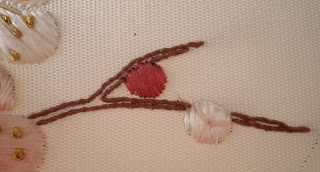
© JEC/Carol-Anne Conway
I only discovered the error after I had used most of the thread to couch along the branches and realised I was going to run out. I referred again to the box chart to make sure I used the same number of threads. The box chart said to use a katayori and the thread I had been couching was a karayori.

© JEC/Carol-Anne Conway
Karayori is the smoother of the two threads. I had stitched mainly the twigs and small branches and had sufficient left to complete the remaining twigs. The more knobbly katayori that I made, I used to stitch the main branch.

© JEC/Carol-Anne Conway
We have plum tree in our garden. The new growth is quite smooth, and the older branches are more gnarled. Although my plum blossoms are not as suggested, I like the outcome of my mistake. Perhaps it was divine intervention.
Happy Stitching

2 comments:
Perhaps, as you say it was divine intervention and the gods of stitching were looking after you. On the other hand, we've all twisted up the wrong thing sometime, so a lesson learned. As you say it reflects the real thing so a happy accident, and it looks pretty, so an even happier accident.
My dear, your plums are beautiful! Now don't take that the wrong way! *wink
As for your kata vs. kara problem...it's all part of the process. and your 30 minutes a day post adding up sounds JUST LIKE MY TEACHER!! Your inspiring me, here. I just might have to rev up my JE needles...
Post a Comment